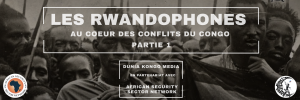Les Rwandophones : Au cœur des conflits du Congo (Partie 1)
FR
 Depuis des siècles, les peuples rwandophones vivent sur le sol congolais. Banyamulenge, Banyarwanda, Hutu, Tutsi… ces communautés, installées dans les Kivu bien avant la colonisation pour certaines, ont contribué à bâtir l’Est de la RDC.
Depuis des siècles, les peuples rwandophones vivent sur le sol congolais. Banyamulenge, Banyarwanda, Hutu, Tutsi… ces communautés, installées dans les Kivu bien avant la colonisation pour certaines, ont contribué à bâtir l’Est de la RDC.
Pourtant, leur histoire est marquée par une quête constante d’intégration, souvent freinée par les exclusions politiques, la stigmatisation identitaire, et les conflits armés.
▶ Dans cette vidéo réalisée dans le cadre de notre partenariat avec Dunia Kongo Media, nous explorons :
👉🏾 Les origines des rwandophones au Congo (avant et pendant la colonisation) ; .
👉🏾 La nationalité contestée sous Mobutu ;
👉🏾 Le rôle du génocide rwandais de 1994 dans la militarisation de la région ;
👉🏾 L’émergence des groupes armés se réclamant “défenseurs des rwandophones” (CNDP, M23, Twirwaneho, etc.) ;
👉🏾 La vie des Tutsis et Hutus congolais à Goma, au Nord-Kivu et au Sud-Kivu.
Dans cette première partie, nous retraçons le parcours des populations rwandophones qui ont quitté le Rwanda pour s’installer dans l’Est du Congo au fil des bouleversements politiques et des conflits inter-ethniques dans la région des Grands Lacs. Ces mouvements de populations et les difficultés d’intégration au Kivu, pour les dernières générations, ont entraîné une série de basculements jusqu’à mener au conflit armé en territoire congolais avec la chute de Mobutu en 1997.
Elle est disponible ici : https://youtu.be/aquI4DafYyc?si=jB4zPJCuOVnSQfT3
ENG
For centuries, Rwandophone peoples have lived on Congolese soil. Banyamulenge, Banyarwanda, Hutu, Tutsi… these communities, some of which settled in the Kivu region long before colonisation, have contributed to building the eastern DRC.
However, their history is marked by a constant quest for integration, often hampered by political exclusion, identity stigmatisation and armed conflict.
▶ In this video, produced as part of our partnership with Dunia Kongo Media, we explore :
👉🏾 The origins of Rwandophone communities in Congo (before and during colonisation) ;
👉🏾 The contested nationality under Mobutu ;
👉🏾 The role of the 1994 Rwandan genocide in the militarisation of the region ;
👉🏾 The emergence of armed groups claiming to be ‘defenders of Rwandan speakers’ (CNDP, M23, Twirwaneho, etc.) ;
👉🏾 The lives of Congolese Tutsis and Hutus in Goma, North Kivu and South Kivu.
In this first part, we trace the journey of the Rwandophone populations who left Rwanda to settle in eastern Congo during the political upheavals and inter-ethnic conflicts in the Great Lakes region. These population movements and the difficulties of integration in Kivu for the last few generations led to a series of upheavals, culminating in armed conflict in Congolese territory with the fall of Mobutu in 1997.
It is available here: https://youtu.be/aquI4DafYyc?si=jB4zPJCuOVnSQfT3
